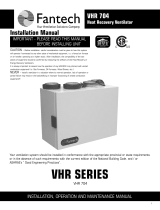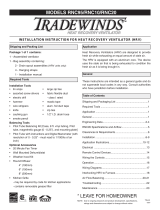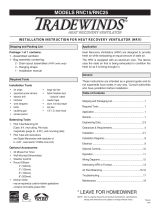Page is loading ...

1
HRVCCLHA, HR VCCSVU, HRVCCLVU
HRVCCSVA, HRVCCSHA
HEAT RECOVERY VENTILAT OR
Owner’s Infor m at ion Ma nual
HRVCCLHA Conventional Unit
HRVCCSVU Compact Unit
HRVCCLVU High Efficiency Uni
t
HRVCCSVA Unit (Top Port)
HRVCCSHA Unit
(
Side Port
)
Fig. 1 -- Heat Recovery Ventilators
NOTE TO EQUIPMENT OWNER:
For your convenience, please record the model and serial numbers of your new equipment in the spaces
provided. This information, along with the installation data and dealer contact information, w ill be helpful
should your system require maintenance or service.
HEAT RECOVERY VENTILATOR
Model # _____________________________________
Serial # ______________________________________
ACCESSORIES (List type and model #)
_____________________________________________
_____________________________________________
INSTALLATION INFORMATION:
Date Installed ________________________________
DEALERSHIP CONTACT INFORMATION:
Company Name_______________________________
Address______________________________________
_____________________________________________
Phone Number _______________________________
NOTE TO INSTALLER:
This manual must be left with the equipment owner.

2
OFF HIGHLOW
ARRET HAUTEBASSE
% D HUMIDITE RELATIVE HUMIDITY
20
25
30
40
50
60
70
80
OFF
ARRET
LOW
BASSE
INTERMITTENT
AIR EXCHANGE
ECHANGE D´AIR
´
ON
MARCHE
% HUM. RELATIVE HUM.
55%
45%
35%
30%
EXT. TEMP. EXT.
% D´HUMIDITE RELATIVE HUMIDITY
´
% HUM. RELATIVE HUM.
55%
45%
35%
30%
EXT. TEMP. EXT.
MODE
AIR EXCHANGE
ECHANGE D´AIR
´
20
25
30
40
50
60
70
80
10°C/50°F
0°C/32°F
–10°C/14°F
–20°C/–4°F
´
´
10°C/50°F
0°C/32°F
–10°C/14°F
–20°C/–4°F
OneTouch
TM
Control
Basic Control
Standard Control Automatic Control
(Not compatible with the following series:
HRVCCSHA and HRVCCSVA
)
INTERMITTENT
MAX
MIN
A05360
Fig. 2 -- Controls
SAFETY CONSIDERATIONS
Recognize safety information. This is the safety-- alert symbol
!
!
When you seethis symbolon the unit and in instructions ormanuals,
be alert to the potential for personal injury.
Understand these signal words; DANGER, WARNING, and
CAUTION. These words are used with the safety--alert symbol.
DANGER identifies the most serious hazards which will result in
severe personal injury or death. WARNING signifies hazards which
could result in personal injury or death. CAUTION is used to
identify unsafe practices which may result in minor personal injury
or product and property damage. NOTE is used to highlight
suggestions which will result in enhanced installation, reliability, or
operation.
OPERATING YOUR HEAT RECOVERY
VENTILATOR (HRV) WITH
ONETOUCHt CONTROL:
Press “PUSH” until the desired ventilation operation is selected.
There are three selections: High, Low, Intermittent. The power indi-
cator light indicates which mode has been selected.
High: This mode is recommended for the removal of excess pollu-
tants and humidity.The ventilator will operate at its maximum speed
continuously. The power indicator light will be lit red when this
mode is selected.
Low: This mode is recommended for normal daily operation. The
ventilator will operate at its minimum speed continuously. The
power indicator light will be lit yellow when this mode is selected.
Intermittent: This mode is recommended when the inside air is too
dry in the heating season or too humid in the cooling season. The
ventilator will operate at its minimum speed for 20 minutes per hour
and be off for 40 minutes per hour. The power indicator light will
be lit green when this mode is selected.
Off: To turn the ventilator off, press “Push” until the power indicator
light is turned off.
OPERATING YOUR HEAT RECOVERY
VENTILATOR (HRV) WITH BASIC,
STANDARD AND AUTOMATIC CONTROL
Your HRV is designed to operate as an integral part of your total
heating and cooling system. With the exception of high capacity
models, which are available with standard controls only, all HRVs
offer 4 control options (See Fig. 2).
S
Basic Controls: Allow the user to manually set theunit to low--
or high--fan speed as required to maximize comfort. Controls
may be unit mounted.
S
Standard Controls: Offer automatic dehumidistat control and
the option to select low speed or intermittent fan during
heating season.
S
Automatic Controls: In addition to the operational features
found with standard controls, automatic controls feature a
recirculation mode. Not for use with forced--air HVAC
systems.
Fan Speed Control—Enables user to modulatefan speed fromlow
to high.
Dehumidistat Control—Allows the user to select the relative hu-
midity level at which the unit would change fan speed to avoid con-
densation problems while heating during the winter months. (See
Table 1).
Continuous Mode—If the relative humidity inside the building is
lower than selected, air exchange would occur with the outside at
low speed. If the relative humidity level inside the building is higher
than selected, air exchange would occur outside at high speed. This
ensures continuous air exchange for constant air quality.
Intermittent Mode—If the relative humidity inside the building is
lower than selected, no air exchange would occur, and the system
would turn off. If the relative humidity inside the building is higher
than selected, air exchange would occur with outside at high speed.
This ensures minimum air exchange level when the building is un-
occupied to minimize operating cost.
Recirculation Mode—If the relative humidity inside the building
is lower than selected, indoor air would be circulated and filtered at
high speed. If the relative humidity inside the house is higher an se-
lected, air exchange would occur with outside at high speed. This
ensures continuous movement and filtration of air for maximum
comfort.
ELECTRICAL SHOCK HAZARD
Failure to follow this warning could result in personal
injury or death.
Before servicing system, always turn off main power to
system. Turn of f accessory heater power if applicable.
There may be more than 1 disconnect switch.
!
WARNING

3
CUT HAZARD
Failure to follow this caution may result in personal
injury.
Although special care has been taken to minimize sharp
edges in the construction of your unit, be extremely
careful when handling parts or reaching into the unit.
Wear appropriate protective clothing and gloves when
working on this unit.
CAUTION
!
PERFORMING ROUTINE
MAINTENANCE
1. The motors are factory lubricated. Lubricating the bearings
is not recommended.
2. The heat recovery core must be handled with care. To ensure
maximum ef ficiency of the plastic partitions wash core once
a year following the season of most intense use.
Allow the heat recovery core to soak for 3 hours in a solution
of warm water and mild soap. Rinse under a stream of warm
water. Hot water and strong detergent should NOT be used,
as it will damage the heat recovery core.
3. A dirty air filter will cause excessive strain on the blower
motor . The filters in your HRV are washable and should be
cleaned every 3 months. Use a vacuum cleaner to remove the
heaviest portion of accumulated dust, then wash in warm
water.
The Air Exchange Indicator light on the auto control will
indicate when filters should be cleaned. The light will flash
on and off until the door is opened to service the unit.
4. Regularly check the screen on the exterior intake hood and
clean as necessary.
5. Examine the condensate drain pan to ensure drains are
functioning properly. Gently clean tray with mild soapy
water. (See Fig. 3 and 4).
BEFORE YOU REQUEST
A SERVICE CALL
S
Check the main power disconnect switch. Verify that the
circuit breakers are ON or that fuses have not blown. If you
must reset breakers or replace fuses, do so only once. Contact
your servicing dealer for assistance if the breakers trip or the
fuses blow a second time.
S
Check for sufficient airflow . Check air filters for
accumulations of large particles. Check for blocked
exhaust--air grilles or ductwork. Keep grilles and duct work
open and unobstructed.
S
If the condensate fails to drain properly, check the grommet
and drain tube for obstructions. Make sure that the condensate
drain tube has a slight slope and is not kinked.
If your HRV still fails to operate properly, contact your servicing
dealer. Give him your model and serial number. With this informa-
tion, the dealer will be able to correct any problems.
Table 1—Recommended Humidity Settings
OUTSIDE TEMPERATURE DOUBLE --- PANE WINDOWS TRIPLE ---PANE WINDOWS
50° F 10° C 55 percent 65 percent
32° F 0° C 45 percent 55 percent
14° F --- 1 0 ° C 35 percent 45 percent
--- 4 ° F --- 2 0 ° C 30 percent 45 percent
--- 2 2 ° F --- 3 0 ° C 25 percent 35 percent
STALE AIR
FROM BUILDING
FRESH AIR
TO BUILDING
FRESH AIR
FROM OUTSIDE
STALE AIR
TO OUTSIDE
A92382
Fig. 3 -- Vertical Application

4
DOOR IS
DETACHABLE
FILTERS ARE
REMOVABLE BY
PULLING STRAIGHT
OUT
ENERGY RECOVERY
CORE CAN BE REMOVED
BY PULLING STRAIGHT OUT
BRIEF CASE
TYPE LATCH
A99300
Fig. 4 -- Horizontal Application
Manufacturer reserves the right to change, at any time, specifications and designs without notice and without obligations.
Copyright 2005 Carrier Corporation
HEATING & COOLING
TO OBTAIN INFORMATION ON PARTS: Consult your installing dealer or classified section of your local telephone directory under the
“Heating Equipment” or “Air Conditioning Contractors & Sy stems” heading for dealer listing by brand name.
Have available the Model No., Series Letter, & Serial No. of your equipment to ensure correct replacement part.
Carrier Corporation S Indianapolis, IN 46231
Printed i n the U.S.A. 11/05
C a t a l o g N o : O M H R V --- 2
Replaces: OMHRV---1
/


